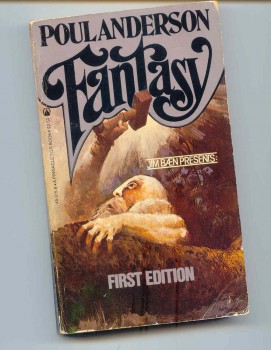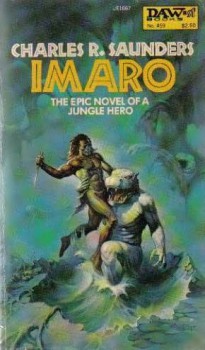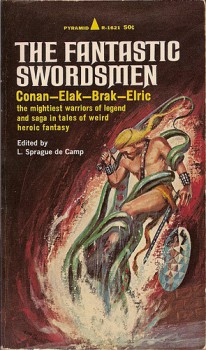Six Sought Adventure: A Half-Dozen Swords And Sorcery Short Stories Worth Your Summer Reading Time
 I’ve always enjoyed fantasy fiction in the short form. In an age when a typical series stretches seven-plus doorstopper-sized volumes without the guarantee of an actual ending, it’s refreshing to take a quick dip into the pool of the fantastic rather than committing to a read akin to a trans-Atlantic journey in the age of sail.
I’ve always enjoyed fantasy fiction in the short form. In an age when a typical series stretches seven-plus doorstopper-sized volumes without the guarantee of an actual ending, it’s refreshing to take a quick dip into the pool of the fantastic rather than committing to a read akin to a trans-Atlantic journey in the age of sail.
If you are new to the heroic fantasy/swords and sorcery genres, the following six stories are fine stepping stones for further exploration, at least in my opinion. I’ve deliberately chosen stories written by authors not named Howard or Leiber; REH and Fritz are the best these genres have ever produced but there’s already plenty of ink spilled about them. I obviously have nothing but praise for “Worms of the Earth” or “Bazaar of the Bizarre” but I’m sure most of Black Gate‘s readers have very likely already read these stories, so I present these six instead.
“The Barrow-Troll,” David Drake, Whispers. Starting in 1977 editor Stuart David Schiff released the first of six anthologies entitled Whispers, a series of best-of collections from a now defunct magazine bearing the same name. “The Barrow Troll” appears in the first of these anthologies.
In his introduction to the story, Schiff describes “The Barrow Troll” as “a brutal and shocking piece.” That about sums it up. It’s a wonderful fusion of horror and fantasy, probably my favorite entry in what is an almost-uniformly excellent collection (though Karl Edward Wagner’s “Sticks” is an absolute gem). The basic details of the story are as follows: Barbarian warrior Ulf Womanslayer seeks out a rumored great treasure housed within a barrow and guarded by the notorious Parma Troll. All you need to know about Ulf is that he received his surname after cutting a woman named Thora to pieces with his great four-foot axe during a hall burning. He’s a berserker, the kind so feared by the English whose coasts they raided, as it was rumored they were incapable of being harmed while in their berserk state.
Ulf drags with him at the end of a rope the captive priest Johann, whose services he requires if he is to kill the troll, according to Thora’s last words. Ulf says, “And she told me of the Parma lord and the treasure he brought back from Ireland, gold and gems. And she said it was cursed that a troll should guard it, and that I must have a mass priest, for the troll could not cross a Christian’s fire and I should slay him then.”
 “Turkhana Knives,” Charles R. Saunders, Imaro. The opening “book” in Saunders’ Imaro introduces us to the titular main character and establishes both his character, the Ilyassai tribe to which he will never quite belong, and the alternate-Africa setting of Nyumbani in bold, unforgettable strokes. Though not yet 15, Imaro here battles jungle beasts, warriors from an enemy tribe, and a lion-headed sorcerer, as well as inner demons of bitterness, failure, and despair.
“Turkhana Knives,” Charles R. Saunders, Imaro. The opening “book” in Saunders’ Imaro introduces us to the titular main character and establishes both his character, the Ilyassai tribe to which he will never quite belong, and the alternate-Africa setting of Nyumbani in bold, unforgettable strokes. Though not yet 15, Imaro here battles jungle beasts, warriors from an enemy tribe, and a lion-headed sorcerer, as well as inner demons of bitterness, failure, and despair.
Imaro wavers between swords and sorcery and epic fantasy. Each chapter of the book can be read as a standalone story (they were initially published as such, in the pages of now defunct magazines like Dark Fantasy and Dragonbone), but they are overarched with the story of Imaro’s journey from boy to manhood. In Imaro, you can see the beginnings of a mythic tale spanning several books. It contains the first rumbles of a coming clash of ancient gods and drops hints that Imaro will be a key player in a world-shaking series of future events. I’ve only read the first book in the series, but plan to finish the journey one day.
“The Tale of Hauk,” Poul Anderson, Fantasy. In the old Icelandic tales nothing was so fearsome as the creature alternatively known as a drow or lich. These animated corpses of the dead were bent on vengeance to right some great wrong, were possessed of an inhuman strength, and were utterly immune to the bite of weapons. “The Tale of Hauk” features such a creature, and it is up to the Danish hero Hauk to put a stop to it. Lending this tale greater resonance and pathos is the fact that the monster, Geirolf, is Hauk’s father. Geirolf has died a “straw death” (i.e., in bed, rather than on the battlefield) and returns as a rampaging revenant to strike back at those who let him wither thus. Weapons will not bite Geirolf; like Beowulf and Grendel, Hauk must engage the monster in a hand-to-hand struggle to the death.
Anderson wrote a metric ton of fantasy and science fiction during his lifetime but I’ve always been partial to his Viking-inspired material, and that seems to be where his heart truly lay. Lin Carter, in an introduction to Hrolf Kraki’s Saga, claims that Anderson’s greatest love, despite his shelf full of Hugo and Nebula awards, was swords and sorcery. Anderson in particular was a master at pastiching the old Icelandic Sagas and capturing the spirit of the age, with its fantastic legends and the slow giving way of paganism to Christianity. Here’s a sample passage that in Anderson’s simple but inimitable style paints the ancient landscape of Finnmark while conveying the passing of an age of heroes:
Before sunset, Hauk had walked forth alone. First he sought the grave of Atli. “I’m sorry, dear old friend,” he said. Afterward he went to Geirolf’s howe. It loomed yellow-gray with withered grass wherein grinned the skull of the slaughtered horse. At its foot were strewn the charred bits of the ship, inside stones which outlined a greater but unreal hull. Around reached stubblefields and walls, hemmed in by woods on one side and water on the other, rock lifting sheer beyond. The chill and the quiet had deepened.
Hauk climbed to the top of the barrow and stood there a while, head bent downward. “Oh, father,’ he said, “I learned doubt in Christian lands. What’s right for me to do?” There was no answer.
“Draco, Draco,” Tanith Lee, The Year’s Best Fantasy Stories 11. If you’re a fan of the film Dragonslayer (and who isn’t?), chances are you’ll like Lee’s “Draco, Draco.” It takes place in the wild, lawless years shortly after the fall of Rome and has a gritty, historical feel to it, albeit with an honest to goodness dragon. A traveling Apothecary (I don’t believe we ever learn his name, but he’s a wonderfully drawn character, shrewd and incisive) is half-bullied into picking up an unhorsed warrior named Caiy (a blustery, posturing sort of fellow, though brave and strong). The two travel to a nearby village suffering under the thrall of a dragon. The villagers placate the beast by offering up a virgin for consumption each year. Caiy attempts to play the role of hero and the results are anything but what you’d expect. Yes, there’s a damsel in distress lashed to a post, but this old convention is turned on its head as Lee deftly demonstrates that the old legends that give rise to “heroes” aren’t always truthful at their core.
“The Sword of Welleran,” Lord Dunsany, In The Land of Time and Other Fantasy Tales. Dunsany is among the most stylish and talented craftsmen in the genre; if you enjoy your fantasy prose written in the “high” or “archaic” style, he’s your man, and he’s on top of his game in “The Sword of Welleran.” The story begins with a dazzling description of Merimna, “a city of sculptured Victories and warriors of bronze,” upon whose battlements walk purple-robed guards bearing pale lights against the darkness. Though the city is flush with wealth, raiders avoid and fear Merimna due to the reputation of its unbroken line of guardians, men with the unforgettable names of Welleran, Soorenard, Mommolek, Rollory, Akanax, and young Iraine. Great statues of these heroes stand sentinel on Merimna’s walls, yet the inhabitants don’t look upon them as memorials. Hope lingers that they will one day come again, for none of the city’s residents have actually seen them die (we later learn that each hero, after receiving his death wound, rides off to a great ravine to die alone, “as great elephants do, hiding their bones away from lesser beasts,” writes Dunsany.)
Three hundred years pass. Eventually Merimna’s enemies grow bolder and discover that the city is undefended, its heroes mere statues of stone, and plan an attack. Sensing danger, Welleran’s spirit — and the rest of the spirits of Merimna’s deceased heroes — leave their comfortable afterlives in paradise and return to their beloved city. The spirits trouble the dreams of the sleeping citizens, warning them of the impending danger and issuing a call to arms. “Go all of you, and thou too, young Iraine, and trouble the dreams of all the men that sleep, and urge them to take the old swords of their grandsires that hang upon the walls,” Welleran urges. Welleran’s call stirs the heart of Rold to take up his red cloak and great curved sword and become the next great hero.
 “Dragon Moon,” Henry Kuttner, The Fantastic Swordsmen. Kuttner’s spirit must have recently passed through the onyx and jade-encrusted editorial halls of Black Gate magazine. A mere day after John O’Neill extolled Kuttner’s “The Graveyard Rats,” I’m taking a moment to sing the praises of his “Dragon Moon.” Despite its brevity, “Dragon Moon” reads like a mini-epic while still preserving all the elements I love about swords and sorcery—grittiness, blood, dangerous magic, elements of horror, and fast-paced action. Kuttner leads off each section of the story with evocative quotes from the likes of Chesterton and the book of Revelation, further lending the air of high fantasy to this decidedly swords and sorcery short story. The opening paragraph sets a wonderful tone (and sight and smell) of adventure that never lets up:
“Dragon Moon,” Henry Kuttner, The Fantastic Swordsmen. Kuttner’s spirit must have recently passed through the onyx and jade-encrusted editorial halls of Black Gate magazine. A mere day after John O’Neill extolled Kuttner’s “The Graveyard Rats,” I’m taking a moment to sing the praises of his “Dragon Moon.” Despite its brevity, “Dragon Moon” reads like a mini-epic while still preserving all the elements I love about swords and sorcery—grittiness, blood, dangerous magic, elements of horror, and fast-paced action. Kuttner leads off each section of the story with evocative quotes from the likes of Chesterton and the book of Revelation, further lending the air of high fantasy to this decidedly swords and sorcery short story. The opening paragraph sets a wonderful tone (and sight and smell) of adventure that never lets up:
The wharf-side tavern was a bedlam. The great harbor of Poseidonia stretched darkly to the southeast, but the waterfront was a blaze of bright lanterns and torches. Ships had made port today, and this tavern, like the others, roared with mirth and rough nautical oaths. Cooking smoke and the odor of sesame filled the broad low room, mingled with the sharp tang of wine. The swarthy seamen of the south held high carnival tonight.
There are some absolutely stunning scenes in “Dragon Moon.” One of my favorites is the hero Elak visiting a sea goddess in an encounter charged with danger and mystery and an undercurrent of sex (in exchange for her help, Elak must spend a moon “drinking of her strength”). Unforgettable too is Elak’s test on the dragon throne of Poseidonia, wreathed in an eldritch flame in a test of his sovereignty in which he will either succeed and attain the kingship or be immolated in fire.
What are your favorite swords and sorcery stories? Any recommendations? Leave ‘em here; I’m always interested to hear of new or old discoveries in the genre.
From Karl Edward Wagner I’m torn between Misericorde and Reflections for the Winter of my Soul.
I second “Reflections for the Winter of My Soul” and add “Two Suns Setting” by K E Wagner.
As an aside I’ll note that all six of the (excellent) selections in the article are pretty easily obtainable — the Anderson & Drake were in the recent Sword & Sorcery Anthology, Tanith Lee’s story was in a recent Night Shade anthology, Imaro and Elak were both reprinted recently, and Sword of Welleran is available free if you do the ereader thing. (Alternatively I’d suggest getting it in Lin Carter’s Young Magicians anthology just because that has so much other good stuff in it.)
Brian,
What a terrific list. You do an excellent job introducing each of the stories, and keeping the summaries spoiler-free. After doing that repeatedly for several recent articles, I know just how hard that is!
My favorite S&S story? Possibly Karl Edward Wagner’s “The Dark Muse,” which we reprinted in Black Gate 1. There’s an excerpt, with some of the original artwork we commissioned, here:
http://www.blackgate.com/black-gate-fiction-excerpt-the-dark-muse-by-karl-edward-wagner/
Wasp/Joe H.: You certainly can’t go wrong with KEW.
As an aside I’ll note that all six of the (excellent) selections in the article are pretty easily obtainable
Thanks for that information, Joe. I had no idea both the Anderson and the Drake stories were in this new anthology. They’re wonderful.
John: Thanks! A few of these stories end in ways you don’t expect, and they’re certainly worth discussing/raving about, but I did my best not to spoil anyone. Thanks for the link.
Great stuff, though I’ve only read three of these. Getting my Planet Stories Elak of Atlantis off the shelf tonight to make it four.
Sounds like I should pick up that Swords and Sorcery antho as well.
[…] of Sword & Sorcery on the BG blog of late, from Brian Murphy’s excellent list of “A Half-Dozen Swords And Sorcery Short Stories Worth Your Summer Reading Time, and Howard Andrew Jones’ skillful examination of the writing technique of the genre’s […]
Well-done Brian, love your selections and delivery as John pointed out.
And I agree with wasp, KEW’s “Two Suns Setting” is a favored tale of my own.
As for other favorites, well, I’ve selected, edited and published a few too many to list here right now, but new and newsworthy S&S tales by many current up-and-coming authors are out definitely out there to be read!
[…] Six-sought-adventure-a-half-dozen-swords-and-sorcery short stories […]